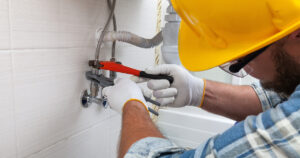Plumbing Springdale AR is a system that brings clean water into your home and sends dirty water away. It consists of pipes, valves, plumbing fixtures, and tanks.

Whether you are a homeowner, remodeler, contractor, or handyman, you can use free plumbing diagrams to make sure your projects run smoothly. These diagrams can also help you avoid wasting time and money.
Plumbing is a system of pipes, fixtures, and vents that convey fluids for a variety of uses. Some of the most common are drinking water delivery, heating and cooling, waste junking, and special systems (oxygen, fuel gas, vacuum, nitrogen).
Pipes are usually made of metal or plastic and come in a wide range of sizes, shapes, and colors. They can be formed via casting or welding and may be joined using threading, soldering, brazing, compression fittings, or solvent welding.
Most pipes and tubing are made from copper or plastic. Both materials have their own unique properties, and each type can be more durable than the next.
Iron piping, sometimes known as cast iron piping, is a heavy-duty material that can last for decades. It can withstand high pressures, and it can be galvanized for extra durability.
PVC piping is another popular choice because it is relatively inexpensive and can’t corrode or rust. It also tends to clog less than other types of pipes.
Polyethylene piping, or PEX, is another durable option that can resist corrosion and is often used for water supply lines. This type of piping is easy to install and is available in a wide variety of shapes, sizes, and colors.
If you’re looking for a hard-working, long-lasting piping material, consider copper. It’s durable and lightweight, and it can be bent to fit tight spaces.
Other options for piping include stainless steel, which is a type of metal that can resist corrosion. It can also endure chlorine disinfection and is less expensive than copper or plastic. Additionally, stainless steel has a higher resistance to heat than copper or plastic. It’s also easier to join than other piping materials, and it’s usually the preferred choice for residential plumbing.
Plumbing fixtures are components of a plumbing system that serve specific purposes and uses. They include faucets, sinks, showers, bathtubs, and toilets. In addition to their functional use, they also have aesthetic qualities that can help enhance the look of a space.
For example, faucets come in a variety of styles and finishes, which can set the tone for the rest of your design. Tubs and sinks can be found in different shapes and materials, too.
While a lot of people think of fixtures as merely functional, they can actually be quite glamorous and make your home feel more luxurious and comfortable. Fixtures are a significant part of any bathroom or kitchen remodel, and they can be one of the most important additions to consider when making decisions about your home.
Whether you are building your dream home or renovating an existing one, you will need to calculate how many plumbing fixtures you will need. This involves taking into account the size of each room and its surrounding area.
The amount of water that needs to be carried through the pipes and the number of fixtures that can share a vent are both important factors to consider. It is best to avoid placing too many fixtures in a single vent, as this can cause the water pressure to drop and create clogs.
The fixture schedule is a crucial tool for determining the size of your plumbing system and the type of pipes needed. It outlines the specifications required for every type of plumbing fixture and ensures that your entire plumbing system meets the standards of the code in which it was designed. The schedule can be updated with ease at any time during the project, either during planning or while construction is underway.




